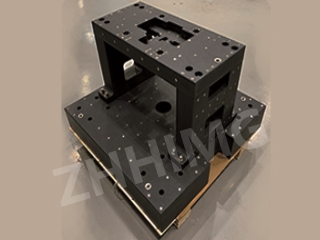Mineral casting, also known as granite casting, has gained popularity in the manufacturing industry due to its superior shock absorption performance compared to traditional cast iron. This advantage plays a crucial role in improving the machining accuracy and surface quality of machine tools.
Granite, a type of mineral casting, offers exceptional shock absorption properties. When compared to traditional cast iron, granite has a higher damping capacity, meaning it can effectively absorb vibrations and shocks generated during the machining process. This is particularly beneficial in the operation of lathes, where precision and stability are paramount.
The superior shock absorption performance of mineral casting lathe significantly reduces the transmission of vibrations to the machine structure. As a result, the lathe experiences minimal deflection and deformation during operation, leading to enhanced machining accuracy. The stability provided by granite casting ensures that the cutting tools maintain consistent contact with the workpiece, resulting in precise and uniform material removal.
Furthermore, the reduced vibration and improved stability offered by mineral casting contribute to superior surface quality of the machined components. With minimal machine-induced vibrations, the likelihood of surface irregularities, such as chatter marks and tool marks, is significantly reduced. This results in smoother surface finishes and finer details on the workpiece, meeting the stringent quality requirements of modern manufacturing processes.
In addition to its shock absorption capabilities, mineral casting also exhibits excellent thermal stability and resistance to environmental factors, further contributing to the overall precision and reliability of the machine tools.
In conclusion, the advantages of mineral casting lathe, particularly its superior shock absorption performance, play a pivotal role in enhancing machining accuracy and surface quality. By minimizing vibrations and ensuring stability, granite casting enables manufacturers to achieve higher precision, improved surface finishes, and ultimately, superior quality products. As the demand for high-precision machining continues to grow, the adoption of mineral casting technology is poised to make a significant impact on the future of machine tool manufacturing.
Post time: Sep-06-2024

